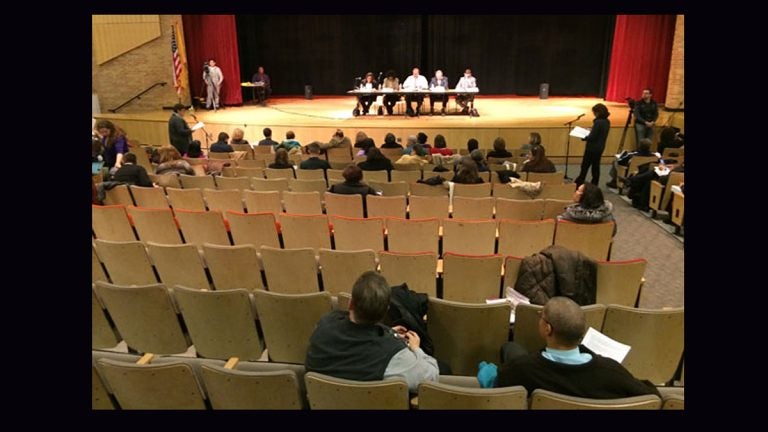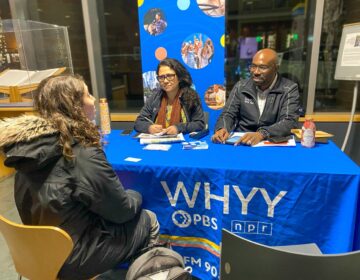Critics blast NJ’s plan to start using PARCC standardized tests

It’s an issue that’s supposedly gripping New Jersey public schools, but the first of three public hearings on student testing — or what critics call over-testing – didn’t exactly draw an overwhelming crowd.
But while only about 50 people showed up yesterday at a Jersey City elementary school for the hearing led by the state education commissioner, there was little doubt where they stood.
One after another, parents and educators spoke against the direction the state and its schools are taking, citing the launch of new student assessments this spring on top what many said is already a too-pervasive testing culture.
The Christie administration and much of the education establishment have been speaking out in favor of the new PARCC (Partnership for Assessment of Readiness for College and Careers) testing, which is starting next month.
No one spoke in defense of PARCC on Wednesday, however, as teachers and at least one school superintendent asserted that testing has gone way too far, way too fast.
Carol Grossi, superintendent of Hanover Park Regional High School district, brought out a ninth-grade student’s schedule for this spring that she said had been totally rewritten to make room for more than a dozen hours of testing, not just by the state but also including Advanced Placement tests and those by the district needed for teacher evaluation.
She also mentioned a state biology test that has been overlooked in the debate over PARCC’s language arts and math testing, but will nonetheless continue.
“This is a ninth-grade honor student,” Grossi said. “He’ll be in PARCC testing for five days … 11 hours of state testing, and doesn’t include test preparation or preparation in how to take the test.
“I am concerned about how classroom instruction will be disrupted for weeks at a time,” she said.
The hearing was the first of three being held by a new study commission created by Gov. Chris Christie to look at the state’s use of testing, a response to growing protests over the PARCC exams.
A second hearing was held last night in Jackson, N.J. The third hearing, rescheduled from earlier this week due to the snow, will be held at Camden Community College in Blackwood at a yet to be determined date.
State Education Commissioner David Hespe was one of five members of the study commission who sat through the three hours of testimony on Wednesday, dutifully reading along with the printed statements and only sporadically imploring speakers to adhere to time limits of five minutes each.
Hespe said afterward that he wasn’t surprised by what he heard.
“Don’t forget, it’s a public testimony session, and people who are going to come to this are going to be somewhat concerned or upset,” he said in a brief interview. “That’s what we heard tonight, and 90 percent was from the educator field, which is helpful to us to hear those perspectives.”
Still, Hespe said he wishes that educators and other critics would also address possible alternatives and solutions.
“What is missing from this conversation and what I have asked from testifiers to address is what would they do to this societal problem where half of the students are graduating without the skills and knowledge they need,” he said.
“We didn’t get any of that,” he said of Wednesday’s testimony. “But doing nothing is not serving our children well.”
That was not entirely true, as a number of people acknowledged the value of some standardized testing as a gauge of school and student progress. But the sentiment was that there is too much testing, and not just at the state level.
There were those who questioned the value of the testing for students who barely know the English language. Others spoke out for children with special needs. . A Newark kindergarten teacher described how she had to do assessments based on whether her 4- and 5-year-old charges could recite “Old McDonald Had a Farm,” rating them from “partially proficient” to “advanced.”
Teacher Phyllis Doerr cited another assessment given in the fall that measured whether her young pupils could decipher symbols, which she said cut into her time for what she would rather teach, such as lessons about courage and heroism in connection to the Dr. Martin Luther King Day holiday.
“I have no time for these lessons anymore, it’s heartbreaking,” Doerr said. “We are forcing children to take tests on things their brains cannot grasp yet.”
_____________________________________________
NJ Spotlight, an independent online news service on issues critical to New Jersey, makes its in-depth reporting available to NewsWorks.
WHYY is your source for fact-based, in-depth journalism and information. As a nonprofit organization, we rely on financial support from readers like you. Please give today.




